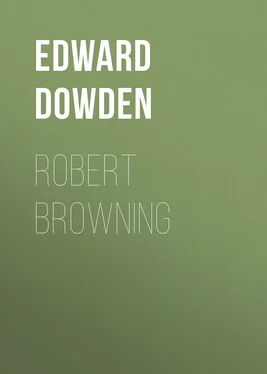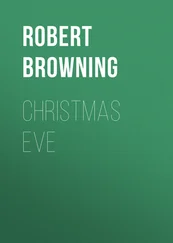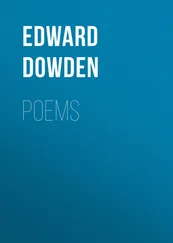Edward Dowden - Robert Browning
Здесь есть возможность читать онлайн «Edward Dowden - Robert Browning» — ознакомительный отрывок электронной книги совершенно бесплатно, а после прочтения отрывка купить полную версию. В некоторых случаях можно слушать аудио, скачать через торрент в формате fb2 и присутствует краткое содержание. Жанр: Биографии и Мемуары, Поэзия, foreign_antique, foreign_prose, foreign_poetry, на английском языке. Описание произведения, (предисловие) а так же отзывы посетителей доступны на портале библиотеки ЛибКат.
- Название:Robert Browning
- Автор:
- Жанр:
- Год:неизвестен
- ISBN:нет данных
- Рейтинг книги:5 / 5. Голосов: 1
-
Избранное:Добавить в избранное
- Отзывы:
-
Ваша оценка:
- 100
- 1
- 2
- 3
- 4
- 5
Robert Browning: краткое содержание, описание и аннотация
Предлагаем к чтению аннотацию, описание, краткое содержание или предисловие (зависит от того, что написал сам автор книги «Robert Browning»). Если вы не нашли необходимую информацию о книге — напишите в комментариях, мы постараемся отыскать её.
Robert Browning — читать онлайн ознакомительный отрывок
Ниже представлен текст книги, разбитый по страницам. Система сохранения места последней прочитанной страницы, позволяет с удобством читать онлайн бесплатно книгу «Robert Browning», без необходимости каждый раз заново искать на чём Вы остановились. Поставьте закладку, и сможете в любой момент перейти на страницу, на которой закончили чтение.
Интервал:
Закладка:
"cyclops-like
Staring together with their eyes on flame,"
which young volcanoes were surely the offspring of the "young earthquake" of Byron. But these are, as the French phrase has it, defects of the poem's qualities. A few pieces of base metal are flung abroad unawares together with the lavish gold.
A companion poem to Paracelsus —so described by Browning to Leigh Hunt—was conceived by the poet soon after the appearance of the volume of 1835. When Strafford was published two years later, we learn from a preface, afterwards omitted, that he had been engaged on Sordello . Browning desired to complete his studies for this poem of Italy among the scenes which it describes. The manuscript was with him in Italy during his visit of 1838; but the work was not to be hastily completed. Sordello was published in 1840, five years after Paracelsus . In the chronological order of Browning's poems, by virtue of the date of origin, it lies close to the earlier companion piece; in the logical order it is the completion of a group of poems— Pauline, Paracelsus, Sordello —which treat of the perplexities, the trials, the failures, the ultimate recovery of men endowed with extraordinary powers; it is one more study of the conduct of genius amid the dangers and temptations of life. Here we may rightly disregard the order of publication, and postpone the record of external incidents in Browning's poetical development, in order to place Sordello in its true position, side by side with Paracelsus .
How the subject of Sordello was suggested to Browning we do not know; the study of Dante may have led him to a re-creation of the story of Dante's predecessor; after having occupied in imagination the old towns of Germany and Switzerland—Würzburg and Basil, Colmar and Salzburg—he may have longed for the warmth and colour of Italy; after the Renaissance with its revolutionary speculations, he may have wished to trace his way back to the Middle Age, when men lived and moved under the shadow of one or the other of two dominant powers, apparently fixed in everlasting rivalry—the Emperor and the Pope.
"The historical decoration," wrote Browning, in the dedicatory letter of 1863, to his friend Milsand, "was purposely of no more importance than a background requires; and my stress lay on the incidents in the development of a soul: little else is worth study." Undoubtedly the history of a soul is central in the poem; but the drawings of Italian landscape, so sure in outline, so vivid in colour; the views of old Italian city life, rich in the tumult of townsfolk, military chieftains, men-at-arms; the pictures of sombre interiors, and southern gardens, the hillside castle amid its vines, the court of love with its contending minstrels, the midnight camp lit by its fires; and, added to these, the Titianesque portraits of portly magnifico and gold-haired maiden, and thought-worn statist make up an environment which has no inconsiderable poetic value of its own, feeding, as it does, the inner eye with various forms and dyes, and leaving the "spirit in sense" more wealthy. With a theme so remote from the common consciousness of his own day, Browning conceived that there would be an advantage in being his own commentator and interpreter, and hence he chose the narrative in preference to the dramatic form; thus, he supposed he could act the showman and stand aside at times, to expound his own intentions. Unhappily, in endeavouring to strengthen and concentrate his style, he lost that sense of the reader's distance from himself which an artist can never without risk forget; in abbreviating his speech his utterance thickened; he created new difficulties by a legerdemain in the construction of sentences; he assumed in his public an alertness of intelligence equal to his own. When it needs a leaping-pole to pass from subject to verb across the chasm of a parenthesis, when a reader swings himself dubiously from relative to some one of three possible antecedents, when he springs at a meaning through the fissure of an undeveloped exclamatory phrase, and when these efforts are demanded again and again, some muscular fatigue naturally ensues. Yet it is true that when once the right connections in these perplexing sentences have been established, the sense is flashed upon the mind with singular vividness; then the difficulty has ceased to exist. And thus, in two successive stages of study, the same reader may justly censure Sordello for its obscurity of style, and justly applaud it for a remarkable lucidity in swiftness. Intelligent, however, as Browning was, it implied a curious lack of intelligence to suppose that a poem of many thousand lines written I in shorthand would speedily find decipherers. If we may trust the words of Westland Marston, recorded by Mr W.M. Rossetti in The Preraphaelite Brotherhood Journal (26 February 1850), Browning imagined that his shorthand was Roman type of unusual clearness: "Marston says that Browning, before publishing Sordello , sent it to him to read, saying that this time I the public should not accuse him at any rate of being unintelligible." What follows in the Journal is of interest, but can hardly be taken as true to the letter: "Browning's system of composition is to write down on a slate, in prose, what he wants to say, and then turn it into verse, striving after the greatest amount of condensation possible; thus, if an exclamation will suggest his meaning, he substitutes this for a whole sentence." In climbing an antique tower we may obtain striking flashes of prospect through the slits and eyelet-holes which dimly illuminate the winding stair, but to combine these into an intelligible landscape is not always easy. Browning's errors of style are in part attributable to his unhappy application of a passage in a letter of Caroline Fox which a friend had shown him. She stated that her acquaintance John Sterling had been repelled by the "verbosity" of Paracelsus : "Doth Mr Browning know," she asked, "that Wordsworth will devote a fortnight or more to the discovery of a single word that is the one fit for his sonnet?" 17 17 Mrs Orr's "Handbook to Browning," pp. 10, 11.
Browning was determined to avoid "verbosity"; but the method which seems to have occurred to him was that of omitting many needful though seemingly insignificant words, and jamming together the words that gleam and sparkle; with the result that the mind is at once dazzled and fatigued.
Sordello, the Italian singer of the thirteenth century, is conceived by Browning as of the type which he had already presented in the speaker of Pauline , only that here the poet is not infirm in will, and, though loved by Palma, he is hardly a lover. Like the speaker of Pauline he is preoccupied with an intense self-consciousness, the centre of his own imaginative creations, and claiming supremacy over these. He craves some means of impressing himself upon the world, some means of deploying the power that lies coiled within him, not through any gross passion for rule but in order that he may thus manifest himself to himself at the full. He is as far as possible removed from that type of the worshipping spirit exhibited in Aprile, and in the poet Eglamor, whom Sordello foils and subdues in the contest of song. The fame as a singer which comes suddenly to him draws Sordello out of his Goito solitude to the worldly society of Mantua, and his experiences of disillusion and half voluntary self-degradation are those which had been faintly shadowed forth in Pauline , and exhibited more fully—and yet with a difference—in the Basil experiences of Paracelsus. Like the poet of Pauline , after his immersion in worldliness, Sordello again seeks solitude, and recovers a portion of his higher self; but solitude cannot content one who is unable to obtain the self-manifestation which his nature demands without the aid of others who may furnish an external body for the forces that lie suppressed within him. Suddenly and unexpectedly the prospect of a political career opens before him. May it not be that he will thus obtain what he needs, and find in the people the instrument of his own thoughts, his passions, his aspirations, his imaginings, his will? May not the people become the body in which his spirit, with all its forces, shall incarnate itself? Coming into actual acquaintance with the people for the first time, the sight of their multiform miseries, their sorrows, even their baseness lays hold of Sordello; it seems as if it were they who were about to make him their instrument, the voice through which their inarticulate griefs should find expression; he is captured by those whom he thought to capture. By all his personal connections he is of the Imperial party—a Ghibellin; but, studying the position of affairs, he becomes convinced that the cause of the Pope is one with the cause of the people. At this moment vast possibilities of political power suddenly widen upon his view; Sordello, the minstrel, a poor archer's son, is discovered to be in truth the only son of the great Ghibellin chieftain, Salinguerra; he is loved by Palma, who, with her youth and beauty, brings him eminent station, authority, and a passion of devoted ambition on his behalf; his father flings upon Sordello's neck the baldric which constitutes him the Emperor's representative in Northern Italy. The heart and brain of Sordello become the field of conflict between fierce, contending forces. All that is egoistic in his nature cries out for a life of pride and power and joy. At best it is but little that he could ever do to serve the suffering multitude. And yet should he falter because he cannot gain for them the results of time? Is it not his part to take the single step in their service, though it can be no more than a step? In the excitement of this supreme hour of inward strife Sordello dies; but he dies a victor; like Paracelsus he also has "attained"; the Imperial baldric is found cast below the dead singer's feet.
Читать дальшеИнтервал:
Закладка:
Похожие книги на «Robert Browning»
Представляем Вашему вниманию похожие книги на «Robert Browning» списком для выбора. Мы отобрали схожую по названию и смыслу литературу в надежде предоставить читателям больше вариантов отыскать новые, интересные, ещё непрочитанные произведения.
Обсуждение, отзывы о книге «Robert Browning» и просто собственные мнения читателей. Оставьте ваши комментарии, напишите, что Вы думаете о произведении, его смысле или главных героях. Укажите что конкретно понравилось, а что нет, и почему Вы так считаете.












